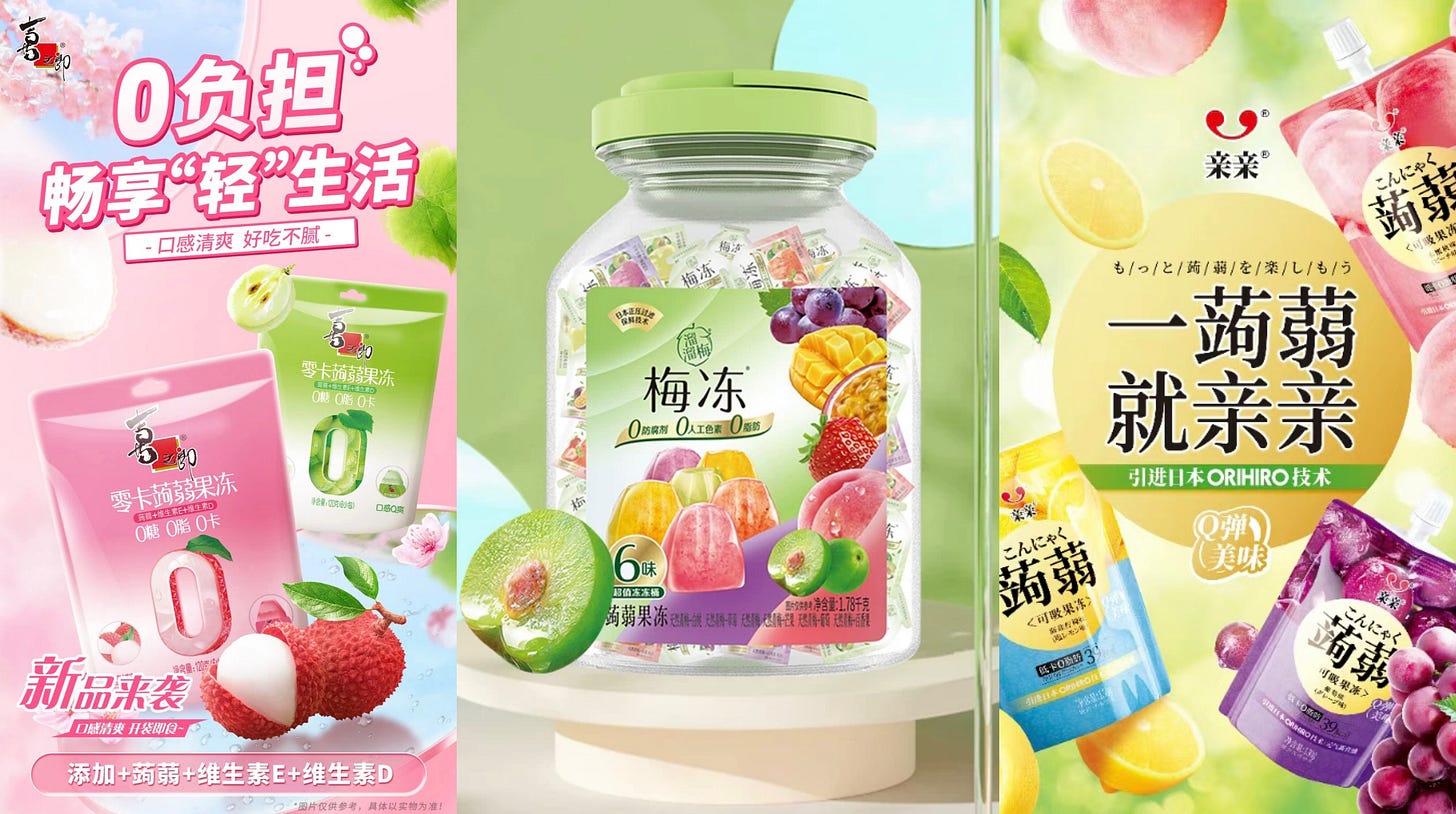Dao Foods views China as the world's most important protein and food market from both a climate impact and business opportunity perspective. Our new series China Food for Thought delves into the rapidly evolving alternative protein sector in China, and the broader market trends within the food industry. We selectively curate and share industry news from China with international audiences that may lack easy access to news and trends in China. Our goal is to provide readers with a ground-up view of valuable industry content from the Dao Foods perspective.
1. Starfield launches new Seaweed-Wrapped Tofu at Sam's Club
Dao Foods' portfolio company, Starfield, has introduced a new line of seaweed-wrapped tofu snacks. Available exclusively at Sam's Club, the product comes in two flavors: teriyaki and chili pepper. Each 100-gram serving, roughly five pieces, contains 13 grams of protein derived from a diverse blend of plant-based proteins including soy, pea, chickpea, rice, and wheat. The snacks are crafted using a low-temperature fermentation process that enhances their texture, making them juicy and chewy.
Currently, Sam's Club operates 47 outlets across China and has emerged as a leading player in the offline retail sector, with total annual sales reaching 80 billion yuan. On Xiaohongshu (a trending social media platform in China with 200M monthly users) only, Sam's Club has garnered significant attention with over 1.37 million posts. Since initiating its partnership with Sam's Club in 2023, Starfield has successfully launched several plant-based products, including plant-based tuna sandwiches, plant-based beef wraps, and a poki salad bar snack, catering to the growing consumer appetite for sustainable food options.
Resource List:
https://mp.weixin.qq.com/s/BvtY2xuNw5zHrIi5kzGzmw
https://mp.weixin.qq.com/s/pgnjqkQxQ2PmNFlms9ZLJQ
Dao Foods Perspective:
Starfield continues to innovate within the plant-based sector, having recently expanded its product range to include coconut milk, shredded beef, and Chinese-style desserts. The introduction of the seaweed-wrapped tofu snack transforms tofu—a traditional ingredient typically favored by older generations—into a modern, appealing product for Gen Z consumers. Sam's Club is the preferred choice for brands in offline grocery store layouts due to its high customer loyalty and the sales momentum it generates. This partnership is seen as a strategic endorsement, strengthening Starfield's positioning when negotiating with other retail channels.
2. Coconut Milk Products Attract A Growing Consumer Base in China.
China's beverage industry has witnessed a significant uptrend in coconut-based products since 2021, initiated by the explosive debut of Luckin Coffee's fresh coconut latte. In just three years, this product has achieved staggering sales, topping 700 million cups, with 300 million sold in the first two years alone. The first half of 2021 saw a proliferation of coconut milk beverages, with over 130 new products introduced by major tea and coffee shops across the nation, some incorporating dairy elements. This trend has expanded beyond beverages as fresh coconut yogurt starts to capture the interest of Chinese consumers.
On April 15th, LELECHA, a leading player in the bubble tea market, unveiled a new lineup of plant-based coconut yogurts in three innovative flavors: avocado, apple and peach, and passionfruit coconut yogurt. Aligning with its "coconut cosmos" theme, the products are uniquely packaged in spherical bottles, designed to resemble various planets, adding a playful twist to the consumer experience. Additionally, for an extra 3 yuan, customers can opt to receive seeds for strawberries, lettuce, or tomatoes, encouraging them to upcycle the used bottle into decorative plant holders. LELECHA's strategic innovation continues to fuel its expansion, with the brand expected to reach 1,000 stores by 2024.
A recent report by Kamen on the "2024 China Beverage Industry" underscores the growing dominance of coconut in the sector, revealing that at least one in every ten new products from surveyed bubble tea brands is coconut-related. Coconut milk, particularly favored for its plant-based properties, accounts for 14.5% of all dairy products utilized, affirming its position as the most popular choice among health-conscious consumers and those favoring plant-based alternatives.
Resource List:
https://www.donews.com/news/detail/1/4175332.html
https://mp.weixin.qq.com/s/p49_tOzldZViJ9TvFOaq0w
Dao Foods Perspectives:
In 2021, the market size of the plant-based protein beverage industry in China was approximately 123.4 billion yuan, with a year-over-year growth exceeding 10%, and it is expected to reach 140 billion yuan by 2026. Currently, the market features a diverse range of options including walnut, almond, coconut, soy, and oat milk. Dao Foods' portfolio company, True Plants, specializes in plant-based yogurt, while WOW Kids, Buck and Plant Now! focus on plant-based milk.
3. Baichuan, China's Top Textured Vegetable Protein Producer, Sets Sights on IPO
Baichuan Bio-Technology, the leading textured vegetable protein producer in China, has registered for guidance with regulatory authorities to pursue an initial public offering. The company aims to convert 20% of meat consumption to plant-based protein.
Established in 2008, Baichuan specializes in the research, development, production, and sales of textured vegetable protein. The company offers a wide range of products including frozen foods, snacks, and plant-based meats, and has expanded its market presence to 32 countries and regions. In 2020, Baichuan achieved sales of nearly 500 million yuan, securing a 51% share of the domestic market.
Baichuan operates two major production facilities in Wenzhou, Zhejiang, and Xinxiang, Henan, with a total annual production capacity of 70,000 tons. The Wenzhou facility produces 20,000 tons of high-end products for food service and export markets, while the Xinxiang site, the largest in China, boasts a capacity of 50,000 tons and features the industry’s first fully automated production line.
Resource List:
https://mp.weixin.qq.com/s/1L6mD8Lkk17VyJ2OF8r1nw
https://mp.weixin.qq.com/s/uzOKJqtgWvWet2iJuv5Quw
Dao Foods Perspectives:
China's position in the plant-based protein sector as an ingredient supplier is significant, reflecting the country's pivotal role in shaping this emerging industry. Despite mixed and slow acceptance by consumers in the domestic market, the global outlook remains positive, indicating robust confidence in the sector's enduring expansion.
4. China's Konjac Snack Market Breaks Through the 40 Billion Yuan Ceiling
In a strategic move that underscores the growing appetite for healthier snacking options, Weilong Delicious unveiled "Little Witch," its latest entry into the spicy konjac snack segment last year. This release is a testament to the brand's sustained investment in the konjac category over the past nine years. The introduction of the “Big Demon King” konjac snack by Yanjin Shop Food has intensified the market competition.
March 2023 marked a milestone for Yizhi Konjac Biotechnology with its IPO on the Beijing Stock Exchange, showcasing the konjac industry's positive momentum. Snack industry giants like Bestore, Jinzai Food, and Koushuiwa Food are making their presence felt in the burgeoning konjac snack market.
Back in 2014, Weilong Delicious captured the market with a konjac snack that replicated the texture and chewiness of meat. Konjac, known for its health benefits such as being high in fibre and low in calories, quickly became a fast-growing segment in the snack category. Following trends set by the Japanese market, konjac jelly made a notable foray into the traditional jelly market in 2020, with brands such as Strong Food, Qinqin, and Liuliumei contributing to the category's explosive growth and driving the development of innovative konjac-based products. By 2020, China's konjac industry had exceeded a valuation of 40 billion yuan, with an impressive average annual compound growth rate of 26% over the preceding decade.
Despite the vast array of products in China's trillion-yuan snack food industry, distinct sub-categories remain rare. According to Frost & Sullivan, the top ten snack food companies accounted for only 8.0% of the market share in 2021, signaling the scarcity of "billion-level" blockbuster products. Nevertheless, plant-based options such as konjac and smoked tofu have achieved "billion-level" success, tapping into the trend toward healthier snacking choices.
Resource List:
https://mp.weixin.qq.com/s/gawLsDsfvqlaLqGSgF2Qxw
https://mp.weixin.qq.com/s/wx9bih-BFGaNdBbMAvY3Zw
Dao Foods Perspectives:
Konjac, a root vegetable native to Japan and China, has gained international acclaim as a versatile and healthy alternative in various food products, such as pasta and rice substitutes, and is used in plant-based seafood, broadening its appeal in Western markets. However, it is not yet a mainstream ingredient. This trend of konjac snack in China merits close attention as it underscores a broader shift towards healthier, plant-based dietary choices, making konjac a staple worth watching in the plant-based food landscape.
5. Tim Hortons Builds Awareness of Bagels Among Chinese Consumers from the Ground Up
As Tim Hortons, the legendary Canadian coffee brand, has been marking its presence in China since 2019, the spotlight isn’t just on its coffee but also significantly on its bagels, which dominate social media discussions, particularly on Xiaohongshu, where seven out of ten posts tagged "Tim Hortons' favorites" celebrate this offering. Despite its recent entry into the Chinese market, Tim Hortons has aggressively expanded, opening nearly 1,000 stores with revenue surpassing 1 billion yuan in just the first three quarters of 2023, and setting a target of 2,750 profitable outlets by 2026.
Originally introduced as a secondary option to sandwiches and doughnuts, bagels quickly became a standout at Tim Hortons due to their rising sales, repurchase rates, and positive consumer feedback. Recognized for their health benefits, being low in oil and sugar, bagels align with the Chinese consumer preference for savory and heated foods. Tim Hortons China tailored these bagels to local tastes by softening their texture and enriching them with grains, while also simplifying their preparation. Outlets now require only an oven and a minimal ingredient station for fresh assembly, optimizing both space and labor efficiency.
The growth in awareness of Tim Hortons and bagels in China has been almost synchronous. With the rise of social media influencers promoting healthier lifestyles, bagels have become a staple in food-related content. The growing lifestyle trends towards health and clean eating further play into Tim Hortons’ strengths. The ensuing bagel craze, ignited by Tim Hortons, has prompted major coffee chains and new gourmet bagel shops to enter the fray, making bagels a fashionable choice among China's urban middle class. Prior to Tim Hortons' entry into the market, bagels were virtually unknown to Chinese consumers, highlighting the impact of effective market adaptation by foreign brands. As Tim Hortons continues to innovate and adapt to local tastes, the industry is watching closely to see what the next major product will be.
Resource List:
https://mp.weixin.qq.com/s/1fSUP5amFV7_fyHKbcirMA
https://mp.weixin.qq.com/s/b-Lk3rW6TFYMBcygmURcOw
Dao Foods Perspectives:
As foreign brands navigate the complexities of the Chinese market, the key challenge lies not in conventional business strategies or product offerings, but in a deeper, more fundamental principle: sustaining innovation post-localization. This principle has shaped Tim Hortons' strategy throughout its five-year tenure in China. Under the leadership of Tim Hortons' China team, the company has adeptly localized products and implemented robust marketing campaigns, enabling the rapid acceptance of new product categories such as bagels by the Chinese consumer within just a year or two. Tim Hortons' story offers valuable insights for other international brands contemplating entry into China's dynamic market landscape.














